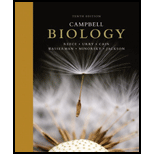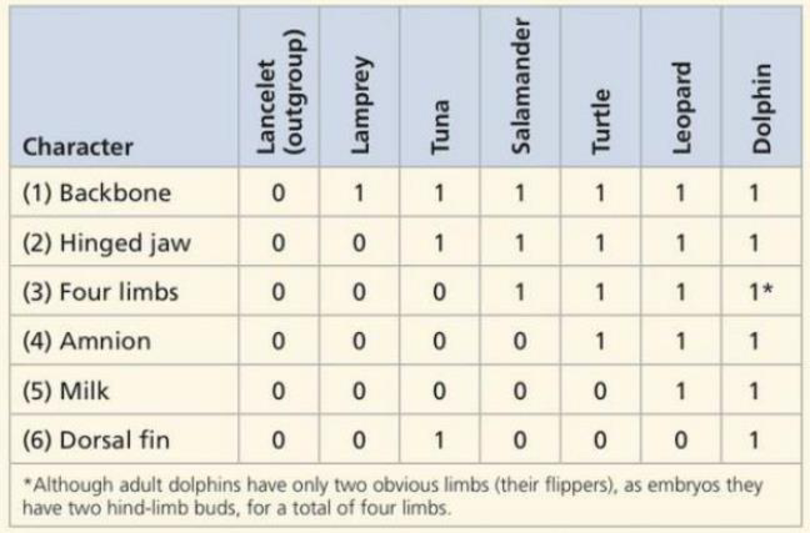
Campbell Biology (10th Edition)
10th Edition
ISBN: 9780321775658
Author: Jane B. Reece, Lisa A. Urry, Michael L. Cain, Steven A. Wasserman, Peter V. Minorsky, Robert B. Jackson
Publisher: PEARSON
expand_more
expand_more
format_list_bulleted
Concept explainers
Textbook Question
Chapter 26, Problem 9TYU
SCIENTIFIC INQUIRY • DRAW IT (a) Draw a phylogenetic tree based on characters 1-5 in the table below. Place hatch marks on the tree to indicate the origin(s) of characters 1-6. (b) Assume that tuna and dolphins are sister species and redraw the phylogenetic tree accordingly. Use hatch marks to indicate the origin(s) of characters 1-6. (c) Determine how many evolutionary changes are required in each tree. Identify the most parsimonious tree.

Expert Solution & Answer
Want to see the full answer?
Check out a sample textbook solution
Students have asked these similar questions
The following table is from Kumar et. al. Highly Selective Dopamine D3 Receptor (DR) Antagonists and Partial Agonists Based on Eticlopride and the D3R Crystal Structure: New Leads for Opioid Dependence Treatment. J. Med Chem 2016.
The following figure is from Caterina et al. The capsaicin receptor: a heat activated ion channel in the
pain pathway. Nature, 1997. Black boxes indicate capsaicin, white circles indicate resinferatoxin.
You are a chef in a fancy new science-themed restaurant. You have a recipe that calls for 1 teaspoon of resinferatoxin, but you feel uncomfortable serving foods with "toxins" in them. How much capsaicin could you substitute instead?
What protein is necessary for packaging acetylcholine into synaptic vesicles?
Chapter 26 Solutions
Campbell Biology (10th Edition)
Ch. 26.1 - VISUAL SKILLS: Which levels of the classification...Ch. 26.1 - Prob. 2CCCh. 26.1 - Prob. 3CCCh. 26.2 - Decide whether each of the following pairs of...Ch. 26.2 - Prob. 2CCCh. 26.3 - Prob. 1CCCh. 26.3 - Prob. 2CCCh. 26.3 - WHAT IF? Draw a phylogenetic tree that includes...Ch. 26.4 - Explain how comparing proteins of two species can...Ch. 26.4 - WHAT IF? Suppose gene A is orthologous in species...
Ch. 26.4 - Prob. 3CCCh. 26.5 - What is a molecular clock? What assumption...Ch. 26.5 - Prob. 2CCCh. 26.5 - WHAT IF? Suppose a molecular dock dates the...Ch. 26.6 - Why is the kingdom Monera no longer considered a...Ch. 26.6 - Prob. 2CCCh. 26.6 - Prob. 3CCCh. 26 - Humans and chimpanzees are sister species. Explain...Ch. 26 - Why is it necessary to distinguish homology from...Ch. 26 - Prob. 26.3CRCh. 26 - When reconstructing phylogenies, is it more useful...Ch. 26 - Prob. 26.5CRCh. 26 - Prob. 26.6CRCh. 26 - In a comparison of birds and mammals, the...Ch. 26 - To appiy parsimony to constructing a phylogenetic...Ch. 26 - VISUAL SKILLS In Figure 26.4, which similarly...Ch. 26 - Three living species X, Y, and Z share a common...Ch. 26 - Prob. 5TYUCh. 26 - If you were using cladistics to build a...Ch. 26 - VISUAL SKILLS The relative lengths of the frog and...Ch. 26 - EVOLUTION CONNECTION Darwin suggested looking at a...Ch. 26 - SCIENTIFIC INQUIRY DRAW IT (a) Draw a...Ch. 26 - WRITE ABOUT A THEME: INFORMATION In a Short essay...Ch. 26 - SYNTHESIZE YOUR KNOWLEDGE This West Indian manatee...
Knowledge Booster
Learn more about
Need a deep-dive on the concept behind this application? Look no further. Learn more about this topic, biology and related others by exploring similar questions and additional content below.Similar questions
- 1. Match each vocabulary term to its best descriptor A. affinity B. efficacy C. inert D. mimic E. how drugs move through body F. how drugs bind Kd Bmax Agonist Antagonist Pharmacokinetics Pharmacodynamicsarrow_forward50 mg dose of a drug is given orally to a patient. The bioavailability of the drug is 0.2. What is the volume of distribution of the drug if the plasma concentration is 1 mg/L? Be sure to provide units.arrow_forwardDetermine Kd and Bmax from the following Scatchard plot. Make sure to include units.arrow_forward
- Choose a catecholamine neurotransmitter and describe/draw the components of the synapse important for its signaling including synthesis, packaging into vesicles, receptors, transporters/degradative enzymes. Describe 2 drugs that can act on this system.arrow_forwardThe following figure is from Caterina et al. The capsaicin receptor: a heat activated ion channel in the pain pathway. Nature, 1997. Black boxes indicate capsaicin, white circles indicate resinferatoxin. a) Which has a higher potency? b) Which is has a higher efficacy? c) What is the approximate Kd of capsaicin in uM? (you can round to the nearest power of 10)arrow_forwardWhat is the rate-limiting-step for serotonin synthesis?arrow_forward
arrow_back_ios
SEE MORE QUESTIONS
arrow_forward_ios
Recommended textbooks for you
 Biology: The Dynamic Science (MindTap Course List)BiologyISBN:9781305389892Author:Peter J. Russell, Paul E. Hertz, Beverly McMillanPublisher:Cengage Learning
Biology: The Dynamic Science (MindTap Course List)BiologyISBN:9781305389892Author:Peter J. Russell, Paul E. Hertz, Beverly McMillanPublisher:Cengage Learning Biology (MindTap Course List)BiologyISBN:9781337392938Author:Eldra Solomon, Charles Martin, Diana W. Martin, Linda R. BergPublisher:Cengage Learning
Biology (MindTap Course List)BiologyISBN:9781337392938Author:Eldra Solomon, Charles Martin, Diana W. Martin, Linda R. BergPublisher:Cengage Learning Biology 2eBiologyISBN:9781947172517Author:Matthew Douglas, Jung Choi, Mary Ann ClarkPublisher:OpenStax
Biology 2eBiologyISBN:9781947172517Author:Matthew Douglas, Jung Choi, Mary Ann ClarkPublisher:OpenStax Human Biology (MindTap Course List)BiologyISBN:9781305112100Author:Cecie Starr, Beverly McMillanPublisher:Cengage Learning
Human Biology (MindTap Course List)BiologyISBN:9781305112100Author:Cecie Starr, Beverly McMillanPublisher:Cengage Learning Biology: The Unity and Diversity of Life (MindTap...BiologyISBN:9781337408332Author:Cecie Starr, Ralph Taggart, Christine Evers, Lisa StarrPublisher:Cengage Learning
Biology: The Unity and Diversity of Life (MindTap...BiologyISBN:9781337408332Author:Cecie Starr, Ralph Taggart, Christine Evers, Lisa StarrPublisher:Cengage Learning Concepts of BiologyBiologyISBN:9781938168116Author:Samantha Fowler, Rebecca Roush, James WisePublisher:OpenStax College
Concepts of BiologyBiologyISBN:9781938168116Author:Samantha Fowler, Rebecca Roush, James WisePublisher:OpenStax College

Biology: The Dynamic Science (MindTap Course List)
Biology
ISBN:9781305389892
Author:Peter J. Russell, Paul E. Hertz, Beverly McMillan
Publisher:Cengage Learning

Biology (MindTap Course List)
Biology
ISBN:9781337392938
Author:Eldra Solomon, Charles Martin, Diana W. Martin, Linda R. Berg
Publisher:Cengage Learning

Biology 2e
Biology
ISBN:9781947172517
Author:Matthew Douglas, Jung Choi, Mary Ann Clark
Publisher:OpenStax

Human Biology (MindTap Course List)
Biology
ISBN:9781305112100
Author:Cecie Starr, Beverly McMillan
Publisher:Cengage Learning

Biology: The Unity and Diversity of Life (MindTap...
Biology
ISBN:9781337408332
Author:Cecie Starr, Ralph Taggart, Christine Evers, Lisa Starr
Publisher:Cengage Learning

Concepts of Biology
Biology
ISBN:9781938168116
Author:Samantha Fowler, Rebecca Roush, James Wise
Publisher:OpenStax College
Phylogenetic Mysteries: Crash Course Zoology #12; Author: CrashCourse;https://www.youtube.com/watch?v=cVaw7nF72Aw;License: Standard youtube license